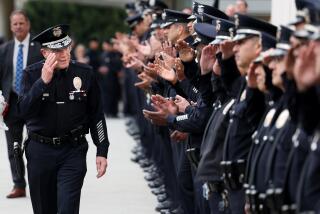Mayor Got Political Style From Police Duty
Many mayors spend their day outfitted like a stockbroker: beige suit and a button on the lapel proclaiming something like “This Town Works Together!”
Richard Melendez, mayor of West Covina, goes to work in a standard-issue navy blue uniform. Instead of a lapel button he wears a badge. It reads LAPD.
By day, the 44-year-old mayor is a cop, the only one on a force of nearly 10,000 who moonlights as the leader of a municipality.
He has been an officer in Los Angeles since 1983, spending most of those years as a patrolman in East and South-Central Los Angeles.
In March 1997, he was elected to the City Council of West Covina, where he has lived since 1975. The five council members take turns serving one-year terms as mayor. After his first year on the council, it was Melendez’s turn.
*
Being an officer, he said, helped form his political self: direct, serious, measured, yet able to move under pressure. “There’s no margin for mistakes on the street. A lot of times as mayor I’ve got to make decisions in the same kind of way.”
Order is his life. His walk (firmly erect), his appearance (each strand of hair perfectly aligned) and his desk (not a paper out of place) call attention to this. “A neatnik,” said one City Council member with gentle humor. “It comes from law enforcement.” His dark eyes look firmly into yours in a regimented, worldly sort of way.
Two years ago Melendez decided that his work on the street was only a semi-solution.
“You lock guys up, they get out, you lock ‘em up again. You see the same faces again and again. I started to realize that’s not the whole answer.”
So he hit the chalkboard: Instead of chasing robbers he now spends his time in grade school classrooms as an officer in the LAPD’s DARE program, which sends officers into schools to try to show children how to resist drug use.
In a cramped room in the Eastside’s Utah Street Elementary School, sandwiched precariously within the Pico Aliso housing project, Melendez recently stood before a group of 20 fourth-graders, all Latino, all in need, as Melendez said later, “of someone to show them a Hispanic male can be positive.”
Some talked about a deadly neighborhood shooting that took the life of a well-known boy the morning before. The children whispered, wanting to ask Melendez what happened. But they also seemed inured. This has happened so often.
“We’ve got to practice now,” Melendez told them. “Practice so you can learn . . . so when you’re in junior high and someone comes up and asks you to join a gang, or do drugs, you’ll know what to do to stay out of trouble.”
He lured Jose Villagron, 10, from his chair to demonstrate.
Jose became a character actor playing a future version of himself. Melendez became a cholo, swaggering coolly, putting on a streetwise accent.
“Hey man, w’as up? You want some beer man, want some drugs?”
“No man, no,” said Jose.
“Whaaat? You scared? Man, if you don’t drink this I’m going to beat you up!” said Melendez.
“I’m leaving. I don’t want to drink any beer. . . . I wanna go watch Mark McGwire!”
*
Teacher Eric Molina had no idea that when Melendez drives home for the day he heads to City Hall. “He’s the mayor of West Covina? Really?”
The middle-class suburb, 25 miles from the Eastside, is pretty well insulated from the urban woes Melendez confronts as an officer. Yet the politics of his municipality sometimes seem, in the words of one longtime observer, like “the Wild, Wild West.”
Consider the events of the past few years: A former police chief was dumped after allegations that he inappropriately hired a business partner as a city consultant; a former mayor was accused of improperly using a city-issued badge and confiscating another motorist’s license after a traffic accident.
There have been bungled hires. One man was picked to be the city manager but lasted less than a day. He went to a City Council meeting and decided to retreat to his old job, saying the “challenges facing West Covina are not those I want to spend my time working on.”
Melendez says he’ll change things. “I’m here to provide leadership. That’s my job.”
At City Hall, he spends much of his time working in his mahogany-paneled office. He organizes agenda items, works on redevelopment plans, and grapples with strategies to bolster the tax base.
When a reporter stops by for an interview, the mayor offers a videotape of his inauguration speech, a copy of the text and an outline of his one-year goals. He provides copies of editorials written about problems in West Covina. On his desk is a neat stack of precisely clipped articles from the reporter’s newspaper. Melendez offers a concise opinion on the merits and pitfalls of each piece.
“I learned about real discipline on the force,” he said.
“Helping run a city is a lot like being out on the street. You’ve got all kinds of different people trying to press their agenda on you. But when the pressure’s on, you’ve got to be willing to take a stand, be a leader and convince people to do the things that are right.”
More to Read
Sign up for Essential California
The most important California stories and recommendations in your inbox every morning.
You may occasionally receive promotional content from the Los Angeles Times.











